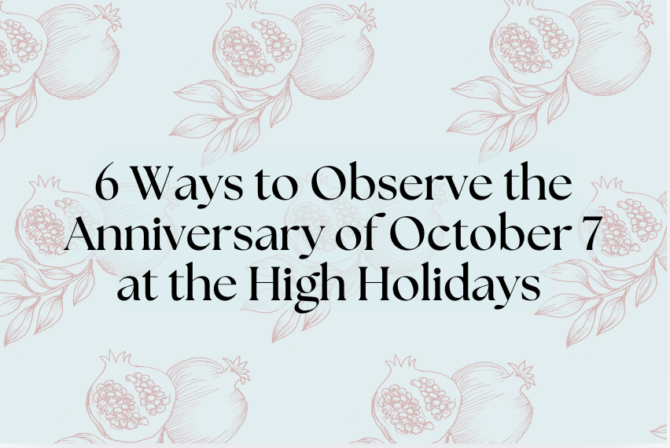Growing up, I learned that because women now could “have it all,” we should definitely “do it all.” It’s only now, in my 40s, that I’ve started to realize this simply isn’t possible. Being both a balabusta and a career woman is very hard, and trying to do it was exhausting and made me feel like a failure at everything.
As a child, I saw how my mother and both my grandmothers worked, took care of the household, and managed all the emotional and practical labor involved in having a family. In addition, my mother devoted hours to volunteer work. At family gatherings, the men would sit in the appropriately named lazy chairs while the women scurried around, cooking, seeing to the children, serving the men drinks and cleaning up the mess. Somehow, these superwomen made it seem like it was easy, and mandatory, to fulfill all these roles.
I was explicitly told that because I was lucky enough to receive a good education, I had to make something of myself. It disappointed some of my relatives that I studied literature and didn’t end up a lawyer or an accountant, but there was an eventual acceptance that teaching at university wasn’t a bad option, even though I didn’t make money the way other, more successful relatives did. Whatever I achieved at work was noted for a moment, and then I was expected to continue on to the next accomplishment. I never took a breath to appreciate what I had done or the progress I had made. I was always looking toward the next thing.
Of course, a successful career wasn’t enough. What was really important was getting married and having children. Again, I proved a disappointment by marrying a woman instead of a man, but I did at least produce children (who are the joys of my life). Family conversations repeatedly emphasized the importance of how I kept my house, what I cooked and how we raised the children. I learned that it was essential to be a “real balabusta,” an excellent wife and mother, someone who keeps on top of everything, is pleasant and never shows how much effort it all takes. And although I have a wonderful wife who shares the tasks (and does many that I can’t do, such as DIY), I nonetheless felt responsible. I had to prove myself to be a true balabusta.
In recent years, I’ve started to feel like the most haggard-looking zombie mother there is. While preparing a class to teach, I might also be thinking about that freelance job I need to finish, and what healthy meal the children might actually eat, and how we need to sort through those onesies in the attic that we’ll never need again, and that one of our children has a spelling test to prepare for, and how I have to put on a load of laundry and take out the garbage, and it’s time to book appointments with the optician, and what birthday present to buy for that party we’re going to this weekend, and whether I accidentally upset another parent at the school, and and and… As many (maybe all?) parents know, it’s exhausting and never-ending.
I was spending more hours at my computer each day than I was asleep; this often included weekends, too. And I still felt I was failing at everything.
A few months ago, I finally decided I’d had enough. I was stressed and unhappy, feeling like I couldn’t even take a Saturday afternoon off to play with my children because there was always another email to reply to, one more task I could do for one of the charities I volunteer for, a syllabus I could improve and that cobweb in the corner I needed to dust.
What was the point in having these wonderful children if I wasn’t making the most of our time together? And what message was I sending to them about what it meant to be an adult, especially a woman? Did I want them to grow up as overwhelmed and anxious as I was?
I may have gotten praise for being a balabusta, but I just felt ashamed of myself.
So, in my attempt to recover from this balabusta syndrome, I am now:
1. Putting fewer things on my to-do list for each day. This allows me some room to reflect and to focus on the tasks that are actually essential. And hey, if I end up getting more things done than planned, I can feel extra-pleased with myself.
2. Lowering my expectations for myself. I thought I had to be super productive every day, but not all days are like that.
3. Letting things go. It would be great to sort through that overflowing closet, but it’s not actively harming us and it’s not more important than sitting and reading to my daughters.
4. Not putting myself down (especially in front of the children). I was shocked when one of my daughters pointed out how negative I was about myself. She made it clear she loved me just as I was and didn’t like how I talked. She said it made her sad, and that in turn made me sad. I promised to do better.
5. Forcing myself to sit with the discomfort. It can actually be painful to step away from the dishes or desk and give myself the freedom of reading in our backyard or watching the children play in a playground. My fingers itch to be working and doing. But I try not to give in. And, this won’t surprise anyone, but it’s really nice to lie on the sand at the beach while my children build a castle next to me.
I may have been taught that I must do it all, but I’m gradually unlearning it. It isn’t easy, and I often find myself slipping back into old habits, but I know I’m a better mother, wife and person for it. I’ve started to understand that my wife and children don’t love me because of what I do, but rather because of who I am. And that is exactly what I want my children to grow up feeling about themselves. I hope they won’t want to become balabustas.








